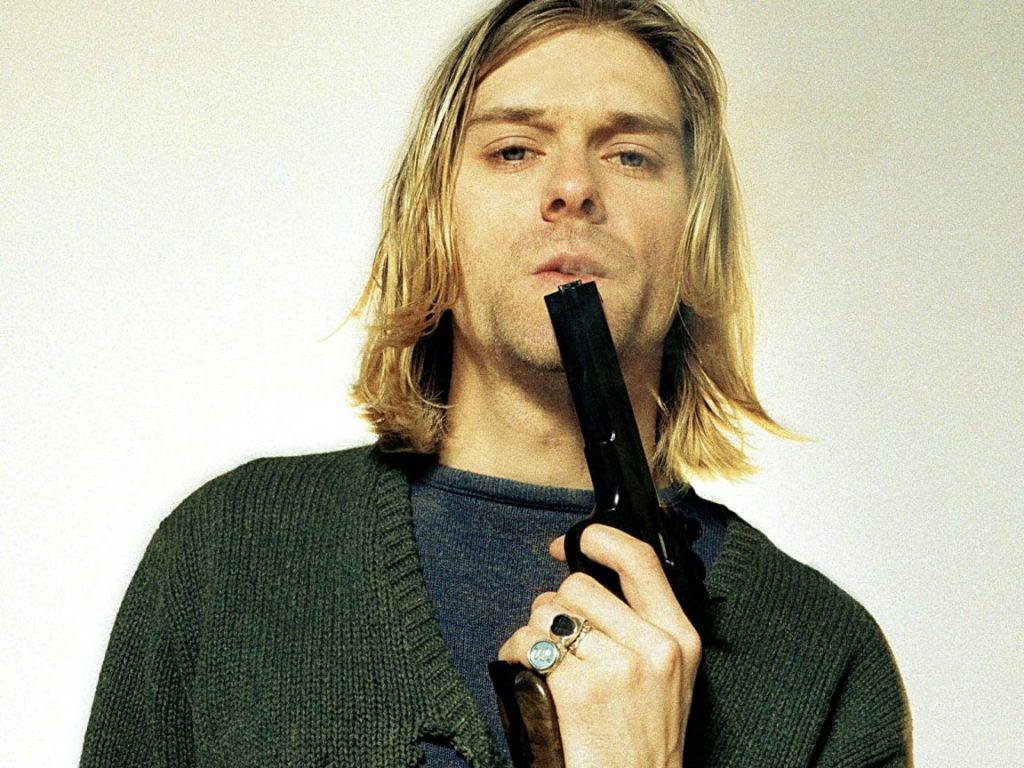“I’m not afraid of dying. Total peace after death, becoming someone else is the best hope I’ve got.” This statement made by Nirvana front-man Kurt Cobain reflects both the self-loathing and general sorrow, or anguish, that he felt he was constantly suffering from and ultimately what led to the tragic event that occurred on April 5, 1994. Kurt Cobain, the lead singer of the band Nirvana, was born in Hoaquiam, Washington on February 20, 1967.1 Few honestly know of the struggles Kurt had to endure in his life, such as his parents’ divorce when he was about nine. This break-up resulted in Kurt losing a permanent place of residence, leaving him in a constant state of borderline homelessness. As a matter of fact, Kurt even resorted to staying at the hospital where he was born around the age of nineteen.2 Regardless, Kurt still managed to climb from rock bottom to become the star he was: the lead singer of Nirvana and the face of grunge music for many people worldwide.

Of course, Nirvana didn’t come straight out the gate making hits nor score international shows. The band Nirvana actually had quite a macabre or fuzzy rise in comparison to other bands. Interestingly enough, Nirvana didn’t even start off being called Nirvana. This small trio actually bounced around with abstract names for quite a few years. From their humble beginnings in Aberdeen, Washington, in 1987 the band was known as Skid Row, Pen Cap Chew, and Bliss all within the same year.3 They played a few house parties and even fewer shows at real venues around the Aberdeen area, but the band life was more of a hobby to the group. They had fun doing what they did, played their hearts out when they had to, but they didn’t really think they were going to be anything huge when they first started out.
The group may have started small, but the effort and time they put into the band would soon enough pay off. In 1989, they released their independent album Bleach, which got them a lot more shows in lots of new places. The band finally started “blowing up” and gathering many followers nationwide. With this newfound momentum, Nirvana signed with Geffen Records and released their second album Nevermind, which has since become legendary. This was just two years after their first independent album Bleach was released.4 Nevermind kicked off Nirvana’s international rise to a new high, scoring them not only shows around the country, but in other countries as well. Nirvana went global and this new, dissonant, and muddy type of rock music started receiving mainstream recognition. This new and quickly popular genre became known and recognized as grunge, a form of punk rock with the muddy sounds of post-punk mixed with a sprinkle of youthful angst.5 This new genre became the sound of the ’90’s, with many bands such as Soundgarden, Pearl Jam, and Alice in Chains riding the wave. But for many worldwide, songs such as “Smells Like Teen Spirit” or most of the songs from Nirvana’s Nevermind album became grunge anthems that depicted the youthful rebellion and dissonance reflected in grunge music.6

Although Nirvana was finally blowing up and rising to international fame quickly, the lead singer Kurt Cobain was still not truly satisfied with his life. Throughout his life, Cobain constantly suffered from stomach illnesses. In response to this constant illness, Kobain would abuse drugs like heroin, claiming it would cure this problem. Even worse, when Kurt met his soon to be mother of his child Kourtney Love, his heroin abuse only got worse.7 With more money and fame, his addiction grew stronger and the pressures of fame and fortune began mounting on his shoulders, until one day it was just too much. In 1994, while on tour in Europe, Kurt had to be hospitalized for drug overdose and other health issues including alcohol problems. Soon after, he was forced to cancel the tour and return back home to Seattle. His family and friends decided to stage an intervention and convince him to admit himself into rehab, much to his displeasure. This rehabilitation did not last long, as Kurt decided to flee the rehab center and return back home to Seattle, tragically unbeknownst to his family and friends. On April 8, 1994, an electrician found Kurt Cobain’s dead body in a room above the garage above his home where he was hiding out at.8 The cause of death was a self-inflicted shotgun blast to the head, and even worse, heroin was found in his system so it’s not even clear if Cobain really meant to do that to himself or if the drugs influenced him to do so.9
Cobain’s inconceivable and unanticipated death resulted in worldwide mourning over the loss of this young artist’s life. Family and friends, especially his girlfriend and daughter, were heavily affected by this tragedy, as well as all of his listeners. Cobain was an icon for Generation X. He gave voice to the youthful generation of people that felt they were dealt a bad hand. He encouraged the generation, and became “the poster boy for grunge.” After Kurt’s death, the grunge scene died down quickly. Of course, there were still other bands in the genre putting out a few successful albums, but the genre never saw the fame and glory it had during its heyday in the early ’90’s, when Nirvana was contributing to the movement.10 The genre died out as quickly as it was born, with the untimely and very unfortunate death of a very talented and tormented young artist.
- Salem Press Biographical Encyclopedia, 2013, s.v. “Kurt Cobain,” by Delbert S. Bowers. ↵
- Nick Soulsby, I Found My Friends: The Oral History of Nirvana (New York : Thomas Dunne Books/St. Martin’s Griffin, 2015). 7. ↵
- Salem Press Encyclopedia, 2013, s.v. “Nirvana (music),” by Alan Haslam; Nick Soulsby, I Found My Friends: The Oral History of Nirvana (New York : Thomas Dunne Books/St. Martin’s Griffin, 2015), 1-18. ↵
- Salem Press Encyclopedia, 2013, s.v. “Nirvana (music),” by Alan Haslam. ↵
- Baker’s Biographical Dictionary of Popular Musicians, 2004, s.v. “Grunge: A Brief History of a Hard Rock Genre,” by Gil Kaufman. ↵
- Baker’s Biographical Dictionary of Popular Musicians, 2004, s.v. “Grunge: A Brief History of a Hard Rock Genre,” by Gil Kaufman. ↵
- Salem Press Biographical Encyclopedia, 2013, s.v. “Kurt Cobain,” by Delbert S. Bowers. ↵
- Salem Press Biographical Encyclopedia, 2013, s.v. “Kurt Cobain,” by Delbert S. Bowers. ↵
- Salem Press Encyclopedia, 2013, s.v. “Nirvana (music),” by Alan Haslam. ↵
- Baker’s Biographical Dictionary of Popular Musicians, 2004, s.v. “Grunge: A Brief History of a Hard Rock Genre,” by Gil Kaufman. ↵



112 comments
Thomas Fraire
Never truly been a fan of Nirvana’s music but i knew who Kirk Cobain was and in reality my guardians were huge fans. To see some place begin from the foot and rise to popularity could be a awesome location and in reality gives trust to anybody searching for answers and needing more for themselves. But in Cobain’s case he let drugs get the finest of him and the activities he chosen to require appeared the influence. Its pitiful but he is still exceptionally compelling and in reality his life story is one to be shared and recollected for eras to come.
Sarah Uhlig
It’s unfortunate how people like Kurt have to go through so much in their life that they don’t want to exist or care for themselves anymore. I love the music he helped make over those years, but hearing how he could be so successful and yet dead inside, enough to do drugs is very sad to read about. Again, it is interesting to read about the artist behind the music, just to understand background to appreciate music in a new light.
Avery Mascorro
I’ve always been a big fan of Nirvana. I recommend the documentary “Montage Of Heck” if you’re really interested. It always puzzled me that it came out as an apparent suicide. When his daughter Frances was born, He seemed almost enlightened and reinvigorated to live for her. His drug addiction was very unfortunate and its very sad that such a talented grunge icon left so soon. He was an avid feminist and gave an overall unique message to the public. This article does a good job of recapitulating Nirvanas brief time in the lime light.
Mia Morales
Growing up I was very familiar with Nirvana and Kurt Cobain’s legacy as an artist. Although by the time I was born Cobain had already tragically passed away, however it is very interesting to me how generations after his death people still appreciate the band’s timeless music. Nirvana is now a household name, whether people are fans of the genre or not their legacy as a band continues through the decades.
Alexandra Lopez
I have always been a fan of Nirvana because my mom in her younger years was into the grunge rock and she let me listen to her music when I was the appropriate age. This article was well written and captured the readers with the influence Kurt Cobain has left. It is a tragedy that such a young talented man left this world too soon, but his legacy will live on. (reposted)
Gabrien Gregory
As a fan of all music genres, Nirvana had an interesting take on punk rock music. Kurt Cobain was an icon for the generation of teen rebels and a nightmare for parents. His music contained a clear image of rebellion but led teenagers in the 90’s to be encouraged to think differently.
This article reflects the importance of mental health and drug abuse; how these to can conspire to create a decline of events that can sadly lead to death. Kurt Cobain is an example of a prominent figure who shed light on such a taboo issue back then and today. Thousands of lives have been taken because of depression, unsafe gun laws, and our lack of mental health availability.
Kacey Diaz
I never really was a fan of Nirvana but my parents were so I heard their music while growing up. I like this article because the author telling us from start to finish about the band’s success. It is unfortunate that Kurt Cobain was suffering and his only outlet was drug, which led to him abusing drugs, but I think the moral of the story is, is that no matter who you are or how much money you have, people of all demographic have the same problems, some more high risk than others.
Diego Aguilera
Never really been a fan of Nirvana’s music but i knew who Kirk Cobain was and in fact my parents were big fans. To see somewhere start from the bottom and rise to fame is a great site and in fact gives hope to anyone looking for answers and wanting more for themselves. But in Cobain’s case he let drugs get the best of him and the actions he decided to take showed the affect. Its sad but he is still very influential
Sienna Guerra
So Nirvana is not typically the music I would listen to but this article was interesting. I have also never heard of the name Kirk Cobain so sorry to those who are like “you’re so uncultured”. Fame is the wonders of getting famous and living the best life until you get a hold of alcohol and drugs and it gets the best of him or anyone. I hope that decisions celebrities make do not influence the followers to do the same thing.
Luis Magana
There are a lot of stories of famous people or celebrities how they start at the bottom and rise to the top. I have never heard of Nirvanas music and I don’t know who Kirk Cobain is either but this articled gave me some insight on them. Sadly when someone comes from the bottom and reaches the top it can lead to drug abuse and them ruining their life even if they have a lot of money or are famous. I loved reading this article and the pictures included.